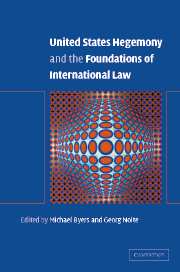Book contents
- Frontmatter
- Contents
- List of contributors
- Preface
- Introduction: the complexities of foundational change
- PART I International community
- PART II Sovereign equality
- PART III Use of force
- 7 The use of force by the United States after the end of the Cold War, and its impact on international law
- 8 Bending the law, breaking it, or developing it? The United States and the humanitarian use of force in the post–Cold War era
- 9 Comments on chapters 7 and 8
- PART IV Customary international law
- PART V Law of treaties
- PART VI Compliance
- Conclusion
- Index
8 - Bending the law, breaking it, or developing it? The United States and the humanitarian use of force in the post–Cold War era
Published online by Cambridge University Press: 13 July 2009
- Frontmatter
- Contents
- List of contributors
- Preface
- Introduction: the complexities of foundational change
- PART I International community
- PART II Sovereign equality
- PART III Use of force
- 7 The use of force by the United States after the end of the Cold War, and its impact on international law
- 8 Bending the law, breaking it, or developing it? The United States and the humanitarian use of force in the post–Cold War era
- 9 Comments on chapters 7 and 8
- PART IV Customary international law
- PART V Law of treaties
- PART VI Compliance
- Conclusion
- Index
Summary
With the global geopolitical and ideological balance of the Cold War era fast receding into distant memory, new issues arise for the continued vitality of international legal constraints on the use of force. The lack of a global competitor to the United States in the security realm, and of a global alternative to liberal internationalism in the ideological realm, has changed perceptions of the role of the peace and security system, especially among Western States, nongovernmental organizations (NGOs), and intellectuals – and particularly with respect to internal armed conflict. The perceived need to accommodate rival conceptions of public order has given way, in many quarters, to a perceived opportunity to harness the unchallenged military power of the United States and its allies to the pursuit of a predominant conception of justice. This development constitutes a potential challenge to the foundations of the international legal system and, above all, to the principle of equal applicability of legal constraints to all States, absent Security Council action. Scholars of that system, it follows, have an onus to position themselves in relation to this development.
This chapter, unlike others in this volume, will focus directly on scholarly discourse.
- Type
- Chapter
- Information
- United States Hegemony and the Foundations of International Law , pp. 232 - 263Publisher: Cambridge University PressPrint publication year: 2003
- 3
- Cited by



